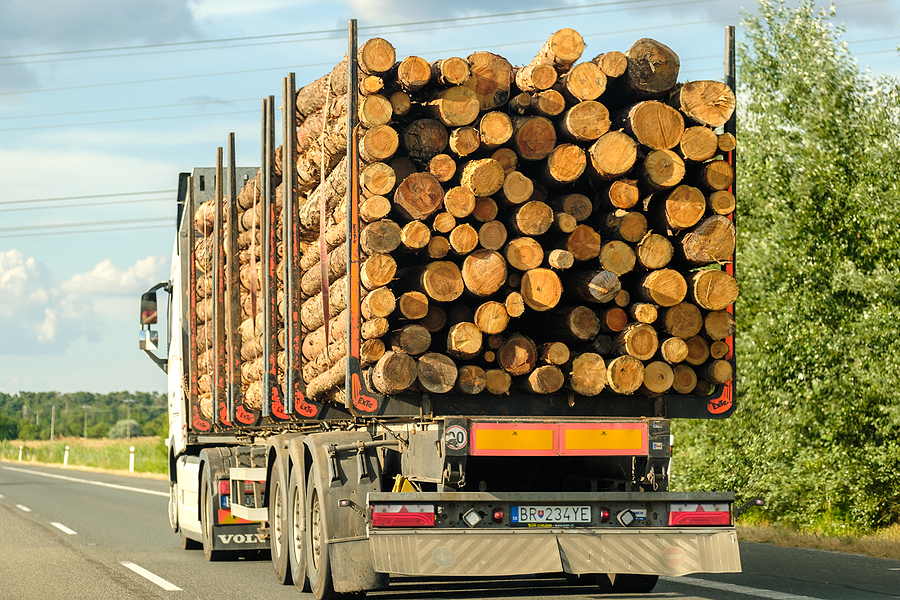When you see a fully loaded flatbed truck in traffic, your instincts warn you to steer clear.
Perhaps you’ve seen a falling cargo tragedy on the evening news. Trucks often jackknife or overturn. Cargo becomes displaced and falls onto passing cars. These incidents damage vehicles in surrounding traffic and seriously or fatally injure their occupants. If you’ve heard only a single story about a cargo-related accident, it makes sense that you would want to keep your distance.
You don’t often see or hear about falling cargo accidents, but they happen every day. These mishaps occur when a shipper, loader, or trucker doesn’t know the rules or fails to follow them. Falling cargo often adds to the damage already caused due to serious truck crashes. Cargo-related accidents occur so frequently and cause so much damage, federal and state transportation regulations include securement rules to guide the loading process.
Horrific Accidents Often Begin With a Cargo Shift
When an improperly loaded truck makes it onto the highway, it doesn’t always end in tragedy. Sometimes a minor cargo shift causes a tractor and trailer to jackknife. At other times, poorly restrained cargo rumbles or slides enough to warn a driver to take action. You might have seen a trucker when he’s stopped and making cargo adjustments along the highway. He’s taking actions that might help prevent a serious accident.
When a trucker is intoxicated, fatigued, or simply distracted, he might not recognize that his cargo isn’t properly secured. Recognition is also a problem with inexperienced drivers. If an inexperienced trucker has the presence of mind to recognize the signs of shifting cargo, he won’t always know what to do.
What Is Cargo Securement?
The Federal Motor Carriers Safety Administration established North American cargo securement standards to prevent transport accidents. These guidelines provide systems for securing all types of cargo. FMCSA guidelines comply with both American and Canadian rules. Federal transportation statutes include formal securement regulations. States often include these same guidelines in state transportation statutes.
As these guidelines are critical to highway safety, they are integral to the commercial driver training, testing, and licensing process. The FMCSA publishes a Cargo Securement Handbook with simplified securement instructions for truckers.
Their primary purpose is to ensure that cargo is either “contained, immobilized, or secured.”
- Securement guidelines describe 13 separate securement systems based on the cargo type.
- They include 19 different securement devices: synthetic webbing, chain, rope, steel strappings, clamps, friction mats, etc.
- The guiding principle explains that cargo should remain secure “…under all conditions that could reasonably be expected to occur in normal driving…”
- These rules apply to all large trucks with a gross vehicle weight rating of over 10,000 pounds (4,500 kg).
- A vehicle’s structure and equipment, tailgate, doors, tarpaulins, spare tires, etc., must also meet secure cargo standards:
- Hauled cargo must not obstruct a trucker’s view or interfere with his movement or the vehicle’s safe operation.
- Cargo must not leak, spill, blow off or fall, become dislodged, or shift in a way that affects the truck’s stability or maneuverability.
How Falling Cargo Accidents Occur
As the above guidelines suggest, failure to comply with FMCSA guidelines often causes a wide range of cargo mishaps and accidents. Bad weather, excessive speed, driver inexperience, and negligent driver actions often cause or worsen loading issues.
Sometimes a cargo shift releases an improperly secured load onto the road. At other times, an accident compromises the securement system, allowing cargo ejection.
Either way, these events cause injuries, vehicle damage, and financial losses due to lost or damaged cargo.
- Flatbed Trucks: Some of the most serious accidents occur when heavy, improperly secured cargo falls from a flat flatbed trailer. Loads often include heavy equipment, machinery, large concrete pipes, logs, construction materials, salvaged cars, and other objects that require open-bed transport. When these heavy items fall into traffic, they can cause extreme damage and catastrophic injuries.
- Loaded Trailers: Cargo accidents also occur when items leave an enclosed trailer due to a faulty or improperly engaged door or latch. The incidents begin with poorly loaded or secured cargo. The cargo sometimes shifts, rolls, or becomes dislodged when a driver turns, stops suddenly, or attempts a maneuver. Vehicles sometimes jackknife when cargo shifts. This causes cargo ejection or simply creates a sudden, unavoidable hazard for oncoming vehicles.
- Dump Trucks: Dump truck drivers make numerous short trips to and from construction sites, landfills, and other work areas. Unlike flatbeds, dump trucks have sidewalls to hold loads in place. During short trips, drivers often leave the tops uncovered, not anticipating a problem. Depending on the load, a sudden stop or an unanticipated maneuver sometimes sends debris over the wall or tailgate and into traffic.
- Specialty Haulers: Car haulers, animal haulers, and other specialty commercial trucks cause complicated problems when they lose their loads. They cause damage and injuries. While ejected animals rarely cause severe damage, they sometimes sustain serious or fatal injuries.
Who Is Responsible for a Falling Cargo Accident?
As with any type of accident involving commercial transport, several entities often share liability.
Truck Driver
Truckers have ultimate responsibility for a poorly secured load. Even when another company loads the cargo, the trucker must recognize and correct any improperly secured loads.
Transport Company
When a trucker has load securement issues while performing within the scope of his job, his employer/transport company is usually responsible. Depending on the jurisdiction, trucking companies often have a separate duty if they negligently entrust a truck and cargo to an irresponsible driver.
Loader/Shipper
Truckers don’t usually load their own vehicles. In many cases, they drive deadhead (without a load) or bobtail (without a trailer.) Depending on the contractual arrangement, the company shipping the cargo attaches its own trailer or loads the transport company’s trailer. In some cases, independent contractors complete the loading operations.
Do You Need a Lawyer if You’re Injured in a Falling Cargo Accident?
Yes. When a falling cargo accident causes damage and injuries, a truck accident attorney provides the assistance you need. Working out your own claim is never a good idea. Attorneys deal with truckers, transport companies, and insurers. They protect your legal rights while you focus on your recovery.
When you consult a truck accident lawyer, your initial meeting is complimentary. You have an opportunity to discuss your accident and find out more about your legal options.


